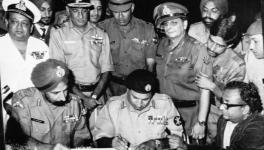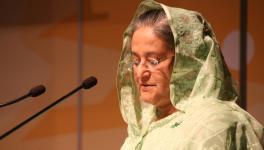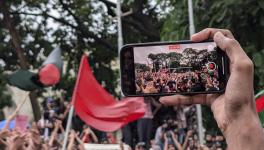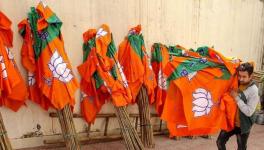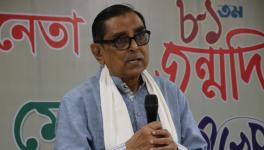Bangladesh Anti-Reservation Protests -- Lessons for India
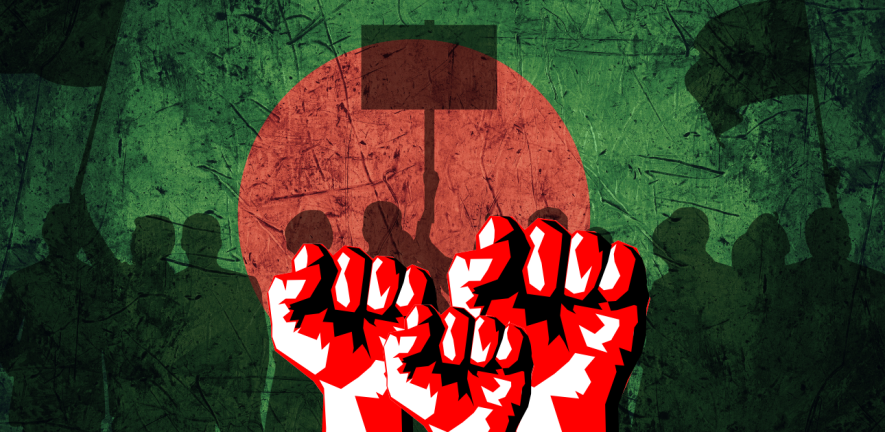
Image Credit: The Leaflet
The anti-reservation protests in Bangladesh, headed visibly by sections of students opposed to Chhatra League, the student wing of the ruling Awami League, went out of control and the government initially imposed a ban on internet service to contain the movement. Later on, curbs were introduced on movement of rail and other modes of transportation and finally, the government brought in the Army after promulgating total curfew. The stoppage of internet services has come in the way of getting the latest news from across the border. From Tuesday night, the Bangladesh government reportedly decided to bring back net services.
Most observers of the anti-quota stir in Bangladesh, before the imposition of internet curbs, were unanimous that there were sufficient ways to avoid the loss of lives (about 200, as per one estimate). The main reason behind this opinion was the absence of any key difference between the stand of the government and the demands raised by the agitators. In fact, the Sheikh Hasina government introduced reforms in the job quota system in 2018 and then virtually suspended the same.
The fresh controversy erupted after restoration of the quota system due to a ruling last month by the High Court. Hasina government moved an appeal before the Supreme Court against the said HC judgement. But before the pronouncement from the Supreme Court on the appeal, a fresh agitation started and newer demands were raised.
There is no doubt that the Hasina government and the ruling Awami League leadership have failed to find an administrative and political solution. Their greatest fault lay in making students of college and universities their adversaries. The government and the ruling party should have anticipated that it was not impossible to find mature brains behind the agitators.
As the quota reform agitation progressed, the presence of an ‘invisible power’ became apparent from some slogans eulogising the Razakars, the rabid anti-Independence force in the neighbouring country. In the garb of opposing the quota for liberation forces, their contributions were being derided (ridiculed) time and again. There is no scope for treating these slogans and statements as faults committed by college-university students due to their immature age. It's a protracted process of the anti-liberation forces in Bangladesh to colonise the mindset of young students with their dogmas and faiths.
In the general election of 1970, the Sheikh Mujibur Rahman-led Awami League got a huge majority in the-then East Pakistan on his demand for the right to self-determination and self-governance. Because of the denial of the result of that election and refusal to invite Sheikh Mujibur Rahman to become the prime minister of Pakistan, the people of East Pakistan rose to fight against the Pakistani military and carved out an independent Bangladesh.
However, even in that historic election, about 30% of the electorate voted against self-determination and independence. The fact is that the people who stood against liberty and freedom and their patrons did not leave the country even after the formation of an independent Bangladesh and stayed adamant in their stand.
The situation that has arisen in the aftermath of the present anti-reservation stir is not new in Bangladesh. The two decades after the assassination of Sheikh Mujibur Rahman along with most of the members of his family in 1975, the country remained under the military rulers and the cohorts of communal forces. The Opposition parties and the common citizens had to take to streets demanding restoration of civil rights. Opposition leaders were put behind bars and curfew became a common feature against popular protests. Offices, academic institutions and markets remained closed for days together and people had to live in a stifling atmosphere.
Even after the re-establishment of an elected government, repeated attempts were made to capture power through unscrupulous means. Fortunately, Bangladesh has not turned fully the Pakistan way. No government since the inception of Pakistan has remained in office for five years at a stretch. Imran Khan, even after raising much hope, was thrown out of power. The sacked former Pakistan Prime Minister is now under incarceration.
Election is the unique and indistinguishable problem in the two of our neighbouring countries. Like in Pakistan, no elections in Bangladesh are free from questions. During the regime of both the two late Generals -- Ziaur Rahman and Hussain Muhammad Ershad -- voting used to be confined in the notifications of election commission.
There were allegations of the elections being a farce even during the times of the two principal political leaders of the country, Khaleda Zia and Sheikh Hasina. The latter's coming to power, consecutively for four times and five times in total is in one sense the victory of the Awami League, meaning thereby the consciousness of liberation forces as well as that of secular ideals, whereas in another sense, her long innings have given rise to more questions regarding the validity of her government.
The questionable election, the tortuous sky-rocketing price rise and the corruption of a few leaders-ministers-bureaucrats have made a large section of the people unhappy and furious. This section is trying seizing the opportunity of the ongoing anti-quota movement.
Prime Minister Hasina has herself gone on record on television saying that one of her former peons was now the owner of Rs 400 crore and uses a personal helicopter. One former head of the Bangladesh police force is missing for the preceding two months. Investigations by media first and later by the anti-corruption department revealed that the ex-police chief made crores of unaccounted money beyond his known sources of income in the form of land, flats, shareholdings and bank deposits. How could a person of his stature become untraceable along with his family?
A viral social media post on purchase of a goat costing over Rs 15 lakh for celebrating Eid by the son of a member of Government Revenue Board also raised pertinent questions on illegal income of the said member. It came to light that the gentleman used to curry favour of the ruling class, irrespective of party affiliation.
When such issues were coming to the fore, the High Court ruling restoring quota system in government jobs was like rubbing salt on wounds, and triggered the students. On the other side, fundamentalists and forces opposed to the independence of Bangladesh started raising their heads. It is difficult to anticipate as to when the people will take to streets against the rulers with questionable validity.
Like pilot cars making ways for VVIP convoys by blowing sirens, in politics, certain issues play the role of a pilot car making other members of the public follow the lead. The Bangladesh protests can be likened to the widespread protests related to the Nirbhaya gang-rape incident of 2012 in India. The timing of the protests against the gruesome torture of a young girl in the capital city of Delhi was very crucial. At that time, common citizens were finding livelihood very difficult due to economic recession since 2008. At the same time, news of corruption was coming to the fore one after the other. Although, many allegations of corruption later proved to be untrue. In politics, exaggeration of complaints is not new.
The Indian ruling class have much to learn from the political goings on in the neighbouring country. The people of this country are also fed up with limitless corruption along with acute price rise and painstaking unemployment. The unusual rise of a few industrial houses under the current regime is unprecedented.
There are some similarities between the current situation in Bangladesh with a few Indian states including neighbouring West Bengal and Assam, where there are widespread allegations of corruption and misrule against the state governments and the ruling parties. The allegations of corruption raised against a few leaders and bureaucrats of these states are also unparalleled.
While agreeing with the irksome realities in Bangladesh, there is no scope for supporting the anti-quota stir with closed eyes. The rise in fundamentalism is a global phenomenon. The largest section of the fundamentalists in India are targeting the reservations granted to the Dalits, adivasis and the Other Backward Classes (OBC). The language of the posts in social media in India in support of the anti-quota movement in Bangladesh is a clear proof that in this country, too, there a background is being created for fresh targeting of reservation.
That's why it's important to know the background of anti-quota stir and the other related issues in Bangladesh. There was reservation of 56% in government jobs in that country. Out of this, 30% are for the family members of the liberation warriors, 10% was reserved for women. There is another 10% for district wise quota, and a small percentage reserved for a few minorities and ethnic groups.
Another point that needs mention in this regard is that, in Bangladesh, merit is never compromised. After successful completion of all the qualifying tests for recruitment, the turn for filling the quota comes into operation. The agitators have demanded total abrogation of quota barring a small percentage to be reserved for ethnic groups and ‘specially-abled’ persons. But it has become apparent from the ongoing movement since early June this year, that the main objection of the agitators is against 30% quota for progenies of liberation warriors.
The percentage of reservation may be revisited and reduced, but how far the demand for total abolition is justified, needs to be questioned. Majority of the three million people who became martyrs by laying down their lives in Bangladesh’s war of independence and also crores of people who joined the liberation war braving the Pakistani military, were mostly from the underprivileged sections of society. Many had not only to face bereavement of their kin, but also became paupers due to the war. They had to start their lives from scratch. Pakistani soldiers apart, fundamentalist groups like Rajakars, Al-Badr, Al-Shams, looted ever pie of the people who took to the war of independence and burnt their houses.
The quota for participants in the war of independence or their survivors was started by Sheikh Mujib in 1974. He fell to the bullets of assassins the next year and the military rulers and governments led by communal forces in the following two decades did not accord any recognition to the quota system. Especially, the liberation war-related reservation was fully denied.
As in India, Bangladesh also does not have any reservation on the basis of religion. But in India, after introduction of OBC reservation, a section of minorities, including Muslims, started getting, may be very small in financial yardstick, some benefits of reservation which is not liked by Hindu fundamentalist forces. The Calcutta High Court in a recent ruling invalidated the OBC quota in West Bengal. Such cases are also pending for adjudication in more than one court. The main objective is to take away the benefits of reservation from the minorities in India.
This writer has already said that Hindu fundamentalist forces are in favour of total abrogation of the reservation system. This has now become apparent from the results of general election of 2024, wherein the Dalits and adivasis could sense the danger and as a result, the ruling Bharatiya Janata Party failed to win a majority, leave alone their poll cry of exceeding 400 Lok Sabha seats this time.
A positive aspect of the reality in Bangladesh is that due to the liberation warriors' quota, the minority communities had the opportunity to avail of the benefits of reservation in government employment, though in a circuitous way. In the event of abolition of that quota, the religious minorities in that country stand to lose even the small opportunity of getting government jobs.
Quotas are never filled in all respects. The position in Bangladesh is not otherwise. A close look at the records of recruitment in government jobs in the country for the preceding few years will show that only a few jobseekers have been able to get the benefits of quota.
Imbalance in development and gender inequality are the reasons for which reservation for women can't be denied. Regional imbalance is also similarly too acute in Bangladesh, as in India. About 20 to 22 districts in the southern region of Bangladesh are extremely backward. Because of unavailability of proper communication with the capital city of Dhaka, those districts had to wage a war against acute poverty. That problem has, to a large extent, been solved with the advent of the bridge across the Padma River. A system of district-wise quota can, therefore, be totally ignored.
But, the reality is that some districts are so underdeveloped that young men and women from there are not able to avail of the benefits of the district quota. It's been averred before that a precondition for availing of quota benefit is the successful completion of all the requisite examinations for recruitment to the respective posts. The scope of higher education in the backward districts is still limited, resulting thereby into quotas remaining unfilled. However, the posts do not remain vacant. They get filled by candidates from the unreserved category.
The latest development with regard to quota is the decision of the appeal side of the Supreme Court in the appeal against restoration of reservation by the High Court; this ruling has sharply brought down the quota in government employment from 56% to only 7%, 5% related to liberation war, 1% for ethnic minorities and another 1% for third gender and specially-abled persons together. The Supreme Court has pronounced that the government has the authority to modify the quota percentage.
Bringing down the quota relating to liberation warriors (Muktijoddha) to a mere 5% is like taking away the sacred thread from priests or depriving the moulvis or Christian padris of their ceremonial robes. The Awami League will lose one of its essential marks of identity and agenda which arouses an awareness regarding the coming into being of the country named Bangladesh.
Besides the same, the Supreme Court pronouncement appears to be a step in a regressive direction for women folk. In the foregoing lines, an effort has already been made to justify the quota for women, which was 10% earlier. Scrapping the same to zero will be an injustice to women who are otherwise deprived of equal opportunities.
Last but not the least, the Awami League has been a creation of a protracted movement against imperialist and hegemonic control over the majority Bengali population by the then rulers of Pakistan, mostly belonging to Western wing of the country and supported by rabid communalists of the eastern part. The movement, initially for self-determination and self-governance under the suzerain control of Pakistan, finally turned into a ‘war of liberation’ and total independence with the ignition of a military crackdown on East Pakistan and incarceration of Sheikh Mujibur Rahman, a leader with a massive popular mandate, leading to the formation of a sovereign Bangladesh.
Awami League, despite minor blemishes, represents the soul and spirit of Bangladesh created by the martyrdom of more than three million Bengalis and the survivors who bravely fought against the biggest genocide in human history. The party is still a secular and anti- fundamental force in Bangladesh and it’s taking a backseat, as it appears from the latest situation in the country, doesn't augur well for the future.
One hopes the ruling party and its government will, sooner than later, adopt measures to set the course in the right direction to put Bangladesh amongst the comity of nations as a country with equal rights and opportunities for all citizens, irrespective of creed or faith and free from dogmas of any nature.
The writer is Executive Editor, The Wall, and former Senior Editor, Times of India. The views are personal.
Get the latest reports & analysis with people's perspective on Protests, movements & deep analytical videos, discussions of the current affairs in your Telegram app. Subscribe to NewsClick's Telegram channel & get Real-Time updates on stories, as they get published on our website.










